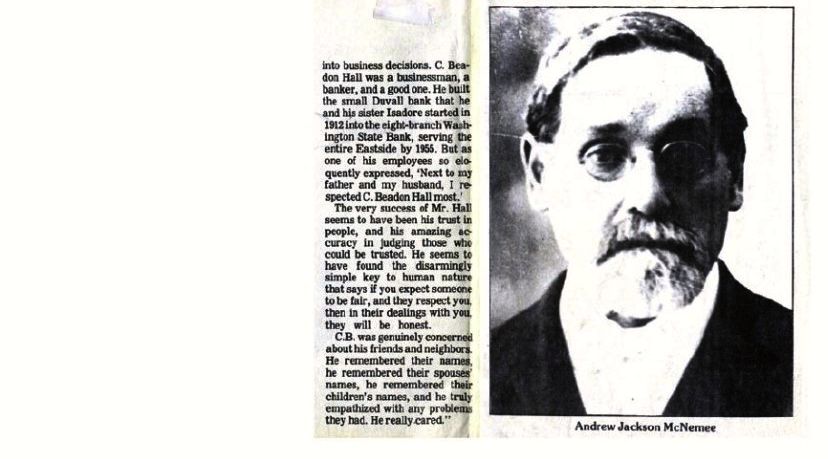Raw, industrious, and entertaining missionaries and preachers drifted throughout our pioneer country. One obliging and robust fellow deserves a closer look. Although his podium is gone, and his parishioners have “entered the eternal forest,” I have in mind the ground-breaking path of Andrew Jackson McNemee – or “Brother Mack.”
Brother Mack hit the “sawdust trail” in the 1870s. This wandering backcountry reverend was remembered by a presiding elder at a 1886 Methodist Church meeting as follows: “He (Brother Mack) didn’t claim to be a great preacher . . .(but) . . . he knew not to rustle (his flock).”
Raised in the 1850s among Natives, White pioneers, wild bear, and hellfire religious ceremonies near the mouth of the Columbia River, Brother Mack was a circuit-riding, homespun preacher who boiled blue jays for dinner and slept on the floor of his patron’s cabins. He once explained to a suspicious farmer that he was preaching in the neighborhood “for want of a better man.” Such modesty and his obliging image netted him a corner of farmer’s cabin and a hot dinner.
Camp meetings were Brother Mack’s specialty. Rousing customers throughout Oregon and Washington, he sold his boots to buy food, strapped himself to a tree’s topmast to escape wolves, and was told at the age of 34 that the Methodist bishop was opposed to sending out “old men” on the circuit.
Brother Mack’s friend and mentor, the Reverend John N. Denison, was threatened by vigilantes during the Seattle anti-Chinese riots of 1885. When Brother Mack arrived on the scene by foot from his temporary base in Squak Valley (Issaquah), Denison greeted him with these encouraging words: “Don’t . . . leave me . . . the mob . . .threatened to kill me and burn up my church . . . If they do, I want you here with me.” Without a second thought, Brother Mack stayed, and the mob dispersed.
Living off the hospitality of strangers, an occasional odd job, and a dollar or two from generous hands, Brother Mack hiked his Pacific Northwest circuit for 33 years. In 1888, he was officially complimented on his “good work, but it was noted that his “district” needed a preacher “who has a wife that can play the organ.” Brother Mack, declined both the wife and, presumably, organ lessons.
The small Washington towns of Langley, Blaine, Chimacum, Ferndale, Kalama, Cherry Valley (Duvall), Edison, and many others, often heard Brother Mack’s rising voice and pleas for the Lord. When he sermonized that saloons in Friday Harbor should be closed – buttressed with a series of fire and brimstone temperance lectures – his life was threatened by imbibers.
Brother Mack attempted to write it all down. His primitive journal, festooned with yarns, charming misspellings, and earnest, original syntax, ended on August 1, 1924.
Twelve years later, at age 88, Andrew Jackson McNemee died on Whidbey Island, thus ending, as he put it, his “endless tale of woe.” His trail and his words read like an exuberant odyssey through a formative period of Pacific Northwest history.
